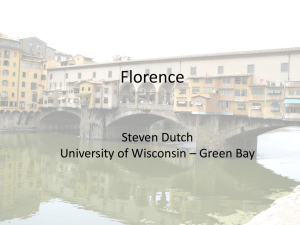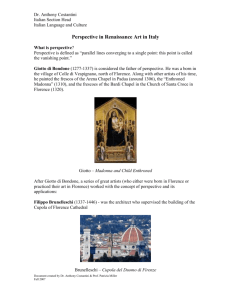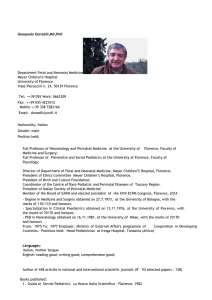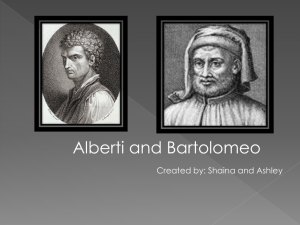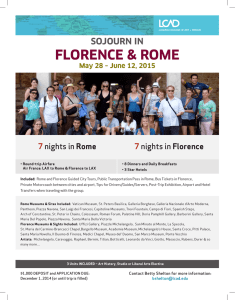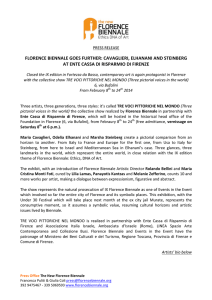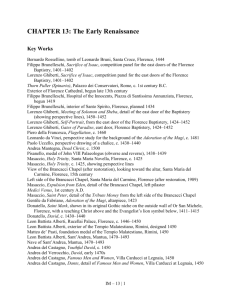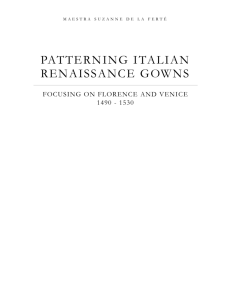Annunciation + Nativity 1259 Madonna Enthroned 1310
advertisement
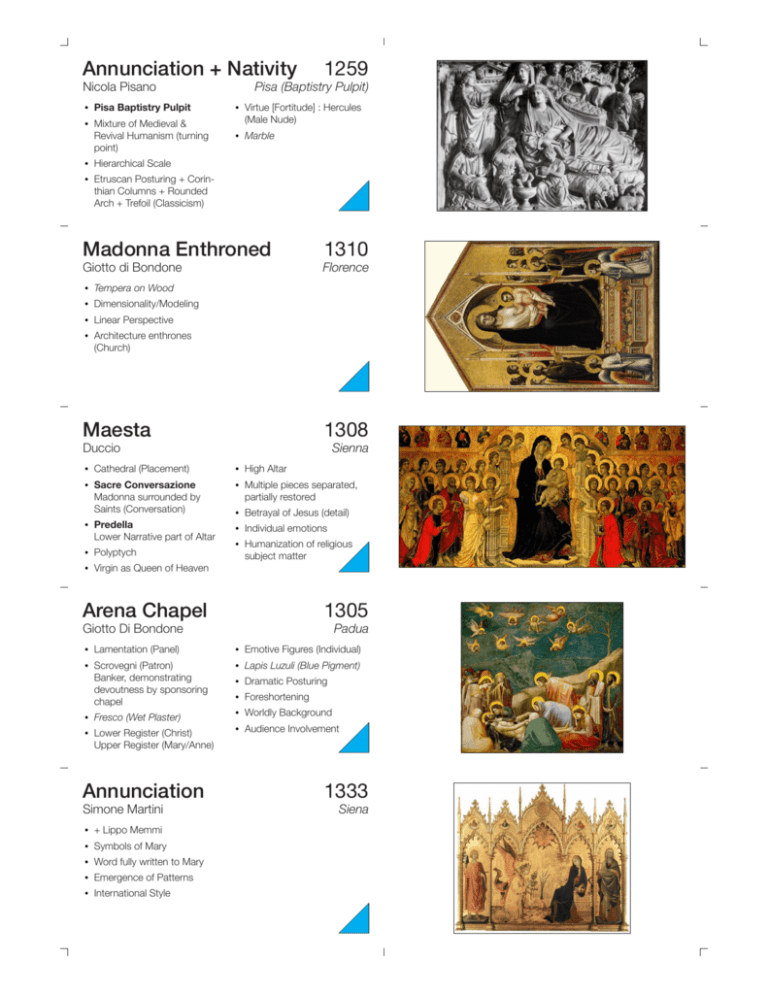
Annunciation + Nativity Nicola Pisano • • Pisa Baptistry Pulpit Mixture of Medieval & Revival Humanism (turning point) • Hierarchical Scale • Etruscan Posturing + Corinthian Columns + Rounded Arch + Trefoil (Classicism) • Virtue [Fortitude] : Hercules (Male Nude) • Marble Madonna Enthroned Giotto di Bondone • Tempera on Wood • Dimensionality/Modeling • Linear Perspective • Architecture enthrones (Church) Duccio • • Cathedral (Placement) Sacre Conversazione Madonna surrounded by Saints (Conversation) Predella Lower Narrative part of Altar • Polyptych • Virgin as Queen of Heaven 1310 Florence 1308 Maesta • 1259 Pisa (Baptistry Pulpit) Sienna • High Altar • Multiple pieces separated, partially restored • Betrayal of Jesus (detail) • Individual emotions • Humanization of religious subject matter 1305 Arena Chapel Giotto Di Bondone Padua • Lamentation (Panel) • Emotive Figures (Individual) • Scrovegni (Patron) Banker, demonstrating devoutness by sponsoring chapel • Lapis Luzuli (Blue Pigment) • Dramatic Posturing • Foreshortening • Worldly Background • Audience Involvement • Fresco (Wet Plaster) • Lower Register (Christ) Upper Register (Mary/Anne) Annunciation Simone Martini • + Lippo Memmi • Symbols of Mary • Word fully written to Mary • Emergence of Patterns • International Style 1333 Siena 1342 Birth of the Virgin Pietro Lorenzetti • Altar of Saint Savinus (Cathedral) • Linear Perspective • Secular Locale • Holy events depicted as taking place in patrons’ homes Siena 1338 Effects of Good Gov. Ambrogio Lorenzetti • Sala dei Nove (Council Room) • Symbolic representations of good government • Liberty depicted in all panels • Earliest Landscape Siena (Palazzo Pubblico) St. Francis Altarpiece Bonaventura Berlinghieri • Maniera Greca (Greek Style) Italo-Byzantine Style • Illustration/Storytelling narrative depicted around figure • Francis identified by brown robe + stigmata (crucifixion wounds) + three knot rope • Hierarchical Scale • Gold Leaf Adoration of the Magi Gentile da Fabriano • Altarpiece for Palla Strozzi chapel in Santa Trinità • Sanctifies Aristocracy • Naturalistic details • Foreshortening (Animals) • Late Gothic splendor (color + costume + frame ornamentation) 1235 Pescia / Lucca 1423 Florence • Rainbow of Color + Gold • Elements of Linear Perspective 1424 Tribute Money Masaccio Florence • Fresco • • Created for Brancacci family chapel in Santa Maria del Carmine Freely moving figures (show anatomy) • Atmospheric Perspective • Christian statement on taxation (Gospel of Matthew) • Three panel narrative • Psychological detail 1424 Holy Trinity Masaccio Florence • Fresco • • Application of mathematics to organization and perspective Portraits of patrons (Lorenzetti) • Placed exactly within perspective of church (use of Trompe L’oeil) • Depiction of space • Formation of trinity in composition • Italian style architecture Florence Cathedral Arnolfo di Cambio • Created through rivalry with Siena and Pisa, to show pride of Florence • Architecture and art style in response to growing power structure • Campanile (Giotto) • Baptistery Gates (Ghiberti) • Dome (Brunelleschi) • Ornamentation in Tuscan style marble geometric designs Madonna Enthroned Cimabue • Composition of Byzantine models • Depiction of receding space • Santa Trinità (Location) • Gold embellishments enhance depth of drapery • Overlapping figures Battle of San Romano Paolo Uccello • Creates illusion of space Linear Perspective Orthogonal Lances Foreshortening • Bartolini (Patron) • Mis-identified as Medici due to medicine apples • International Style 1296 Florence 1280 Florence 1438 Florence • Commemorates Florentine victory over Sienese in 1432 • Niccolò da Tolention (friend of Cosimo de’ Medici) depicted leading charge Camera degli Sposi Andrea Mantagna 1474 Mantua • Oculus • Fresco • Room of the Newlyweds Peacock is attribute of Hera/ Juno (signifies marriage) • Reminiscent of Pantheon • Gonzaga (Patron) • Depiction of cupids in the window to the heavens • Trompe L’oeil (Deceives the Eye) Perspective and illustrated architecture 1501 Dead Christ Andrea Mantagna • Extreme foreshortening & perspective • Unusual depiction of Lamentation • Naturalistic depiction of Christ (light halo) • Entombed body, drapery highlights anatomy Milan • Study from cadaver shows growing science in relation to religion 1440 David Donatello • First revival of free-standing nude in Bronze • Commissioned by Cosimo de’ Medici (Humanist) • David is symbol of Florence (relationship to other citystates) • Male youth depicted as Florence effeminate (possible homoeroticism in winged helmet) • Boyish depiction shows hand of God in defeat of Goliath 1482 Birth of Venus Sandro Botticelli • Revival of female nude • Tempera on Canvas • Based on poem by Angelo Poliziano • Zephyrus and Chloris deliver Venus to Cyprus, met by Pomona • Stylized background Florence (pageantry) distinct from humanism 1482 Primavera Sandro Botticelli Florence • Venus shown as Madonna • Cupid (son of Venus) above • Depiction of Christian subject through classic figures (reconciliation) • Three Graces + Zephyrus (west wind) + Chloris + Flora + Mercury • Represents Spring and Fertility • Humanist setting • Symbolic halo • Orange Trees show Medici (Patron) Flagellation of Christ Piero della Francesca • Setting is palace portico of Pontius Pilate • Focus not on Christ • Classical architecture with Linear Perspective • Focus on mathematics and architecture - beauty in geometrical clarity and purity • 1455 Urbino Wrote first treatise on systematic perspective Gates of Paradise Lorenzo Ghiberti • Isaac and His Sons (detail) • Linear perspective • Placement on east doors of Baptistery • Gilded Bronze • Result of competition (comparison of Sacrifice of Isaac by Brunelleschi) • Abandons quatrefoil pattern on south and north doors • Scenes from Old Testament • Combination of painterly one-point perspective and sculptural modeling 1445 Gattamelata Donatello • Revival of Equestrian statue • Accurate relative proportion between man and horse • Erasmo da Narni (Subject) • Symbolic of Individualist • Hegemony over the Earth Padua 1438 Annunciation Fra Angelico • Simple & Serene depiction of humble Mary • Architecture is plain and humanist Florence Giovanna Tornabuoni Domenico Ghirlandaio • Oil and Tempera on Wood • Conventional profile portrait (though three-quarter views were beginning) • Character reading • Subject identified through symbols and patterning Holy Family with Angels Fra Filippo Lippi • Tempera on Wood • Holy family depicted in distinct humanist style • Precise & smooth delineation of forms • Linear style shows contours of form • Movement through drapery 1425 Florence • 1488 Florence 1455 Florence Use of live models for paintings & referenced landscape Hercules and Antaeus Antonio del Pollaiuolo • Revival of Greco-Roman mythology symbolism in art • Straining figures show departure from frontal and casual forms in sculpture • Similar forms depicted in engravings by Pollaiuolo (Battle of Ten Nudes) 1465 David Andrea del Verrocchio • Medici (Patron) • Realism and Naturalism • Triumphant posturing, casual grace Florence Bartolommeo Colleoni Andrea del Verrocchio • Figure depicted as strong and righteous, horse noble and prancing • Colleoni (Patron) commissioned to compete with Donatello’s Gattamelata • Created after death of subject Santa Maria Novella Leon Battista Alberti • Design of West Facade only (covering Gothic church) • Balance and harmony through symmetry and repetition • Mathematical approach • Square proportions • Geometrical relationships Duomo (Dome) Filippo Brunelleschi • Dome of the Florence Cathedral • Solved problem of spanning the opening with thin double shell anchored with lantern • Ogival structure (pointed arch) • Originated theory of Linear 1470 Florence • 1481 Venice 1456 Florence Scrolling Volute Form + Triumphal Arch 1420 Florence Perspective (used in paintings, early Masaccio) 1495 The Last Supper Leonardo da Vinci Milan • Refectory, Santa Maria delle Grazie • Judas traditionally displayed on opposite side of the table • Oil + Plaster • Relatable, human figures • Experimental medium, not Bonne Fresco • Halo indicated by doorway • Disciples in four groups of three • Use of life models live models in studies • Instructing disciples in communion • John as youngest (feminine) 1511 Fetus + Uterus Leonardo da Vinci • Anatomical studies from cadavers displays scientific interest and understanding • Originated cut-away views for scientific illustration 1503 Mona Lisa Leonardo da Vinci • Character portrait (knowledge of the soul through viewing) • Popularized three-quarter perspective • Innovative at time • Smiling indicates family name Giocondo (light Florence hearted or bemused) • • Sfumato (Vanishing) Layers of Glaze + Oil Soft, glowing texture Chiaroscuro Light + Dark Modeling 1509 School of Athens Raphael Rome • Stanza dell Segnatura, Vatican Palace (Papal Study) • Plato (Leonardo) Points up (God) • References to Greco-Roman Architecture (Triumphal Arch) Sculptures (Apollo + Athena) • Aristotle Points down (Observation) Convention in search of Truth (Intellectual + Divine) • • Heraclitus (Michelangelo) • Euclid (Bramante) • Raphael (far right, next to Ptolemy) • Philosophers + Scientists Madonna of the Meadow 1505 Raphael • Oil on Wood • Influence of Leonardo (pyramidal composition) • Light tonalities and surroundings (after Perugino) • Preferred clarity to obscurity Baldasarre Castiglione Raphael • Friend of Leo X (Pope) • Author of handbook on genteel behavior • Attributes of Renaissance Courtier • Half-length, three-quarter • Attention to personality and psychological state 1514 1511 Sistine Ceiling Michelangelo Buonarroti Rome Disegno (Holy) Design + Preparation • Sistine Chapel, Vatican City • • Pope Julius II (Patron) Wanted to restore Rome to its former glory • Grisaille Monochrome painting imitating sculpture • Focus on human figure • Overcame complicated surface perspective • Scenes of Genesis • Creation of Man in God’s Image (detail) • Sibyls + Prophets 1501 David Michelangelo Buonarroti Florence • Emotionalism and Tension (Hellenistic) • Abandons self contained figures (turn of head) • Attention to detail and surface contours • Connection to presence beyond scope of sculpture • Depiction before victory, in preparation for it - David as strong figure, not helpless • After classical nude 1498 Pietà Michelangelo Buonarroti • Sadness and eternal beauty of Virgin (appears younger than Christ) • Attention to texture • French cardinal Jean de Bilhères Lagraulas • Displayed in Old Saint Peter’s Last Judgement Michelangelo Buonarroti • Altar wall of the Sistine Chapel • Self portrait in flayed skin of Saint Bartholomew • Paul III (Patron) • Saved on left Damned on right • Depiction of wrath in motion Rome • Pietà, standard mourning scene from northern repertoire 1536 Rome of Christ and violent deformation of figures Early Italian Renaissance 14 Century 1200-1400 th 13th Century • • Classical tradition revived • Nicola + Giovanni Pisano • Bonaventura Berlinghieri • Cimabue • • • • • • • Beginning of Humanism (Scholarly concern with the natural world) Giotto di Bondone Duccio Ambrogio Lorenzetti (Secular) Simone Martini Masaccio (15th) Gentile da Fabriano Arnolfo di Cambio Middle Italian Renaissance 1400-1500 15th Century • Florence (Medici Patronage) Center of Renaissance • Patronage also from Papacy, courts in Urbino & Mantua • Revival of Greco-Roman Mythological themes • • • • • • • • • • • • Donatello Andrea del Verrocchio Lorenzo Ghiberti Antonio del Pollaiuolo Paolo Uccello (Secular) Domenico Ghirlandaio (Secular) Filippo Brunelleschi Sandro Botticelli (Classical) Leon Battista Alberti Fra Filippo Lippi Piero della Francesca Andrea Mantagna High Italian Renaissance 1500-1521 Early 16th Century • Further development of perspective, anatomy, classical cultures • Florence & Rome (Centers) Design preparation (Disegno) • Venice (Color + Paint) • Leonardo da Vinci (Chiaroscuro) (Atmospheric Perspective) (Sfumato) • Raphael • Michelangelo • Giovanni Bellini • Titian • Giorgione • Bramante • Andrea Palladio EIR Early Italian Renaissance MIR Middle Italian Renaissance HIR High Italian Renaissance
